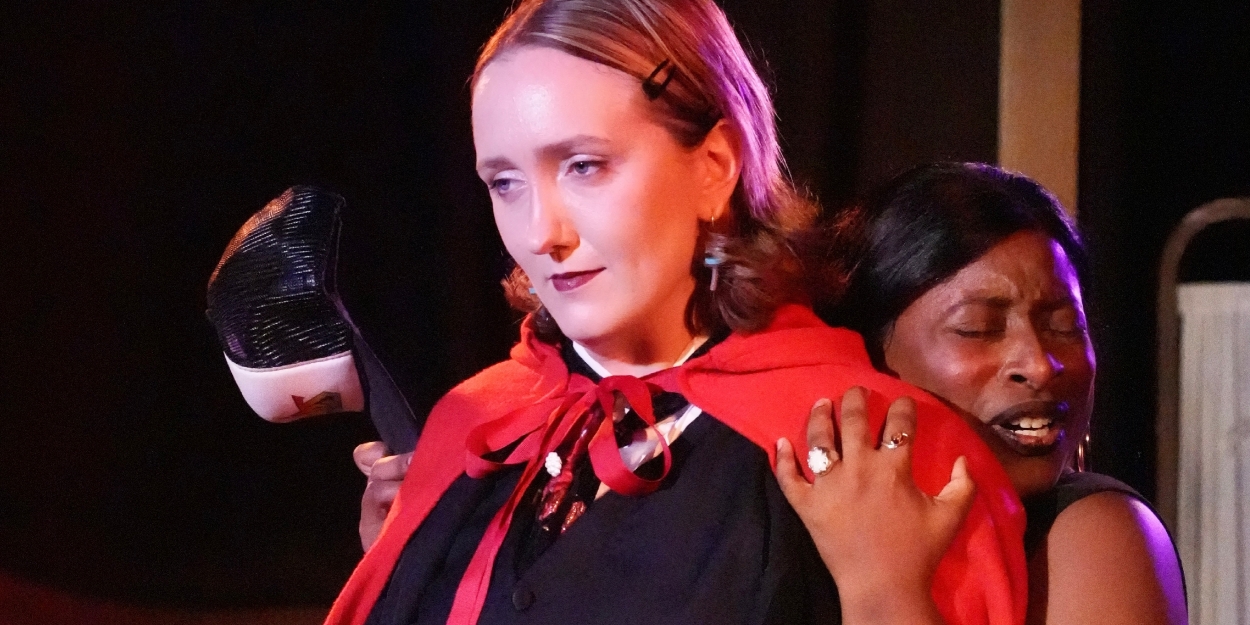Review: WOLF KINGS at Young Liars
The Young Liars' remarkable new piece is now playing at The Chapel.

It’s a headlong dive into a fiercely black, wildly comic nightmare. It’s a venture into betrayal and menace and sex and chaos, and into the unplumbed depths of the psyche. It’s Wolf Kings, the Young Liars’ remarkable new piece now playing at The Chapel.
Young Liars is a very exciting experimental theater group led by Chuck Harper and Maggie Conroy. It first appeared on the scene almost seven years ago, and since then they have produced a show—oh, whenever they kind of feel like it. Wolf Kings makes their sixth.
The ensemble includes mostly the company’s regulars plus one or two you will know from other small edgy groups—SATE or ERA. They are Ashwini Arora, Maggie Conroy, Frankie Ferrari, Cassidy Flynn, Keating, and Kay Ailee Bush.
Wolf Kings is a meditation on “Little Red Riding Hood”—a telling and retelling and re-retelling and reshaping of this old tale, with different actors taking the roles of Little Red, the Wolf and Grandma—but each time it’s different. In some cases the stranger Little Red meets in the woods isn’t quite a wolf. It’s almost like Phillip Glass’s strategy of endless, yet subtly shifting, reiteration. And—this is based on Perrault, the first published version of this ancient tale, so there is no rescuing Woodsman. When Little Red Riding Hood is eaten she is Dead!
The company describes the work thusly:
“Part Victorian Drag Show, part Parisian Literary Salon, and part Fairy Tale Resistance Rally, Wolf Kings blends witty conversation, savage karaoke, ecstatic dance, and vicious fortune-telling into an original Young Liars spectacle.”
To which I can only respond “Bouche de loup!” (equivalent to our “from the horse’s mouth”) This phrase is lofted by all players after each vignette, as if in a toast. It has, of course, overtones of the bloody “mouth of the wolf”.
We begin in darkness, with violent sounds surrounding us. Is it warfare? Is it demolition? Is it powerful deep-throated motorcycles revving? Anyway, it’s menacing. On stage the piano and other furniture are draped. The players arrive one by one, each donning a black tail-coat. They look like waiters in a very uppish Victorian club. Maggie Conroy, in black trousers, suspenders, and a man’s “wife-beater” undershirt, evokes the Emcee in Cabaret. (It’s odd how a woman’s wearing a man’s formal clothing can make her even sexier—like Marlene Dietrich in tails.) After a while Ms. Conroy dons her tail-coat. There’s a sense of angry urgency as they ready the scene.
At one point a bright hatchet is displayed. Now, the old theatrical rule is, “If you show a gun in Act 1 then by golly it’d better be used by the end of Act 3”. The same applies to hatchets!
This, it seems, is a gathering of some sort of sisterhood. To celebrate? To relax, free from the dystopian horrors of their world? Is it mere entertainment--or is it a kind of ritual?
The last to enter is a man, Julian (Cassidy Flynn). The ladies at first want to shut him out, but Julian is flamingly gay, and he insists that he be allowed entrance into their “ladies’ night”.
There is wonderful movement—dancing of a varied, novel, and athletic sort. This is a hallmark of Young Liars, for which choreographer Mikey Thomas merits huge praise. It is so very, very precise and synchronized and polished.
There is music—some French songs on the Victrola, a ferocious classical riff on the piano, a romantic “Dancing in the Dark”. Julian shrieks a comic ballad about “I was a good little girl ‘til I met you!” There is one really dirty ragtime song.
Ms. Conroy shows impressive piano skills.
Games are played:
women comically rejecting compliments
aristocratic ladies at Versailles surrealistically killing their husbands
and finally the theatricale—“Little Red Riding Hood”.
There are continual references to related ancient lupine or lycanthropic tales.
We meet an old-fashioned wolf-whistle “wolf” (Bush) who crudely tries every pick-up line she knows on the young girl. We meet “The Boy Who Cried ‘Wolf!’ (Flynn)—a shepherd lad longing for a flat in New York’s Garment District. (Is he a wolf in shepherd’s clothing?)
We hear of the “Vanished Bride” who transmutes into a wolf. (Her wolf-paw is chopped off whereupon it changes into a human hand.) Late in the show pink mannequin hands are placed like candles around the scene.
There is much sexual undertone: a little girl endangered by the possibility of seduction or rape or just by her entry into adult sexuality. One “wolf” that Little Red meets is a comic cartoon German psychiatrist (Keating) who delves deeply into Freudian/Jungian analysis of Little Red.
One Little Red (Arora) remembers living this tale thousands of times. Sometimes she dies, sometimes not. Another one (Ferrari) seems unfamiliar with the role, and carries a script. (Is she someone disguised as Little Red?) There are hints that Little Red is herself the Wolf.
There is divination—which grows into a threatening interrogation. Slowly a betrayal is revealed and vengeance is imminent.
Then, finally there’s an odd, calm little coda in which Little Red meets a pajama-clad lunatic in his asylum.
Unfailingly the entire cast displays an utter discipline, a simply amazing keenness of focus, and a deep, deep investment in this very strange piece.
Don’t miss it! It’s the Young Liars’ production of Wolf Kings. It plays at The Chapel through November 27.
Reader Reviews
Videos

